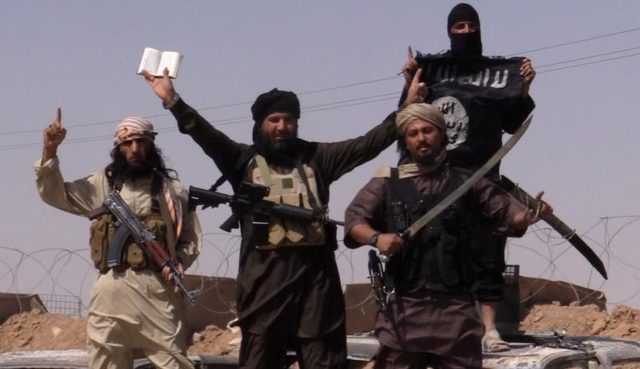
Moscow Seeks to Reinforce Trump’s Belief That Force Alone Can Defeat Islamic State
Publication: Eurasia Daily Monitor Volume: 14 Issue: 6
By:

For at least the last 15 years, there has been an intense debate in both Russia and the West about how radical Islam can be defeated. Some argue that force alone is sufficient, but their opponents say that because radical Islam is an ideological project, it can be defeated only if the use of force is supplemented by the elaboration of an alternative narrative for Muslims. Otherwise, the latter group argues, those threatened by Islamist radicalism will find themselves in the position of a “whack-a-mole” game in which some Islamist projects will be defeated only to be replaced by others.
Russian President Vladimir Putin is among those who argue, all evidence to the contrary in the North Caucasus (see EDM, May 1, 2013) and abroad, that force alone is sufficient, that seeking to engage in dialogue of any kind with Islamists is a fool’s errand, and that Islamists can only be destroyed. Now, he appears to have gained an ally in that view with the inauguration of Donald Trump as President of the United States. And the Kremlin leader is sending signals via various channels that the two should approach Islamism as “a police matter” rather than as an ideological challenge.
The clearest indication of this comes from a Facebook post by Yana Amelina, an analyst closely connected with the Kremlin via the Russian Institute for Strategic Research. Amelina has often been a leading indicator and promoter of Putin’s line with regard to the North Caucasus in particular and the Muslim world in general. On January 9, she wrote that “radical Islamism as a global project has completely exhausted itself” and that “the struggle with it is not an ideological but a police problem” (Facebook.com/yana.amelina.92, January 9).
Her words were reinforced today (January 24) by Abdurashid Magomedov, the Republic of Dagestan’s interior minister. Magomedov declared that the transfer of the functions of the Federal Migration Service to the Ministry of Interior had “helped in the control over the flow of Dagestanis to Syria,” where several thousand of them have been fighting on the side of the Islamic State. Only law enforcement bodies and the force structures can work effectively against such people, he argued (Chernovik.net, January 24).
Moscow faces two problems regarding its fight against Islamist radicalism. On the one hand, no matter how many adherents of radical Islam it has killed be it in the North Caucasus or in Syria, new supporters of that trend have emerged—often in even greater numbers. Indeed, the Russian government finds itself in the situation of those who try to fight a grease fire by throwing water at it. Such a strategy only causes the fire to spread (Vzglyad, August 25, 2015).
And on the other hand, Russian officials openly admit that they do not know how to counter the Islamic State’s ideological messages or how to block its highly-developed recruitment strategies. Igor Barinov, the head of the Russian Federal Agency for Nationality Affairs, admitted as much last year, when he said that Islamist radicals have put out a message that is attractive to all kinds of people, even young women who may be seeking husbands (Lifenews.ru, Nazaccent.ru, January 20, 2016).
What then is Putin hoping to gain by encouraging Trump’s impulse to believe that force is enough? At least three things: First, if the Islamic State’s ideology is irrelevant, so too are the ideological positions of those who may join together to fight it. Thus, by pushing this line, Putin is opening the way for the kind of purely hardheaded military cooperation between Moscow and Washington that Trump has often suggested is one of his chief goals in order to defeat the Islamic State.
Second, if one believes that force alone will defeat Islamism, then one is driven to conclude that authoritarian regimes like Putin’s own or that of Bashar al-Assad in Syria are entirely justified in their harsh measures. To the extent Putin can encourage Trump to accept that notion, he will reduce still further any interest in the current US administration to condemn human rights violations in such countries and even gain support for what Moscow is doing at home and abroad.
And third, by pushing an approach that, at some level, even Putin knows is counter-productive—however superficially seductive it may be—the Kremlin leader can guarantee that radicals in the Muslim world will again turn their focus away from Russia and back toward the West in general and the United States in particular. Consequently, any US hopes for expanded influence in the Muslim world will likely be dashed for a long time to come.
In short, even though Putin’s promotion of the notion that force alone is sufficient to defeat the Islamic States is unlikely to lead to that outcome, the acceptance of the Kremlin leader’s ideas on this point is almost certain to result in a defeat for the United States. And that is almost certainly Putin’s larger goal.



